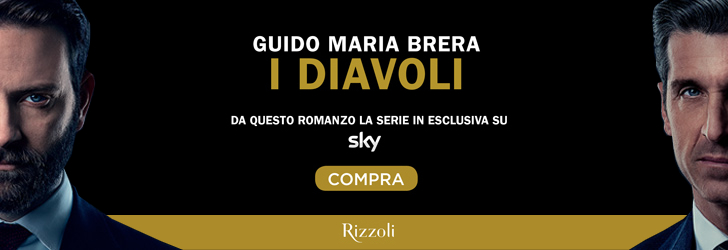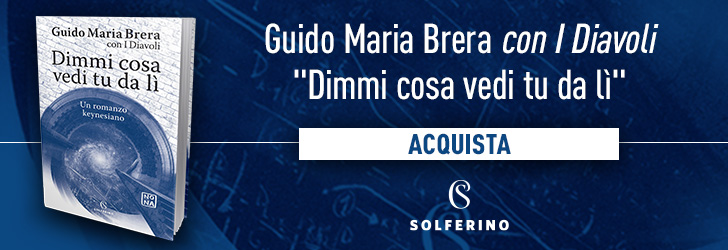
Decodificare il presente, raccontare il futuro
TREDICESIMO-PIANO
ven 12 giugno 2020
From Philip Wade’s diary
The university was my privileged observatory on the great changes in society. Still, meanwhile, Wall Street dominated the scene outside. Financial bubbles filled the air like the bombs of the so-called “humanitarian wars”. With bitterness and disenchantment, I saw the roaring 1990s lay the foundations for a cluster of contradictions that would have exploded in the following decade.
Federico Caffè, the Duke University and Yale. But also: the “Chicago boys”, the Nasdaq and the financial bubbles of the roaring ‘90s ready to explode and disrupt the balance of the new century. The narrating voice this time rewinds the tape of Professor Philip Wade’s diary, one of the characters of The devils (again in the bookstore in the new Rizzoli edition, on the occasion of the release of the TV series of the same name) and melancholic protagonist of La fine del tempo (The End of Time, La Nave di Teseo) by Guido Maria Brera.
***
In September 2001, the world was shaken and my life revolved in the opposite direction. The eyes of the planet converged on the United States, and a blank page slipped under the new century. It would haven’t been my century, I was already aware of that. And there was nothing new for me. In the weeks in which the smoke from the rubble of the Twin Towers still swirled down, I went back. After a decade in the States, back to England…
I’d left defeated, I’d come back disappointed.
After my PhD at Cambridge, I was invited as a Visiting Professor of Economic History at the Duke University, North Carolina. I felt the weight of time on my shoulders, even though I was much younger than I am today. I felt the fatigue, I felt the defeat before the triumph of Ms. Thatcher, the defeat of the miners, the Falkland War. And what’s more, the ‘80s had taken a master away from me, Federico Caffè.
The Soviet Union was crumbling. So I thought it was necessary, rather than useful, to accept the Duke’s proposal. I was not wrong.
It was a balm. I felt that the world was giving me something back when I met Michael Hardt and Frederic Jameson, who taught philosophy and literature there. I also liked my role as the young professor from the old Europe. It was an exciting experience. The American academic world was the opposite of America: the freedom to experiment was absolute, the campuses were poles of true creativity. That’s why after two years at Duke, when I was called to Yale, I accepted without even thinking about it.
I was gonna stay a long time. The University would have become my privileged observatory of the great changes of those years.
And actually, everything changed.
The economic theory on which I had been trained became obsolete. The great battle between the Chicago “boys” and the progressive school, of which I was a part, was resolved in a hybrid theory that excluded radical positions. Globalization dominated the scene, Beijing had embraced Adam Smith, inflation was no longer a danger and labour costs collapsed under the blows of mass relocation.
Teaching became a different exercise from the past. Academic rigidity did not exist, we were contemporary. We needed to update texts and programs in real time, and Yale was the perfect place to do it. Business banks and corporations were picking talents from the Ivy League, seducing students and professors with salaries which had been unthinkable a few years earlier.
The macroeconomic research of the big banks was not yet subordinate to the interests of the banks themselves. No one was really innocent, and yet there was a degree of freedom that would be lost in the Zero Years.
Meanwhile, outside the university, Wall Street dominated the scene. The Nasdaq and the entire technology sector were driving relentless growth. Bubbles filled the air like the bombs of so-called “humanitarian wars,” which promised to export democracy. Bill Clinton was perfectly in tune with the spirit of the times, like a fan pointed in the direction the storm was heading. Without realizing it, politics was planting mines on the ground of the new Millennium. I was getting more and more uncomfortable.
I saw the roaring ‘90s lay the foundations for a cluster of contradictions that would have exploded in the following decade. Nothing would have been the same as before.
Someone talked about the end of history, but the truth was that a new history had just begun.
In the midst of this great euphoria, we economists were regarded as Cassandras. We raised, unheard, our red flags, signalling excesses, the growth of inequalities, the real estate bubbles, the rhetoric of productivity that was just the slaughter of living labor. Only the No Global movement seemed to be on our side.
Wild globalization would have destroyed rights acquired in years of struggle, they cried, on the altar of competitiveness and productivity. But the both of us were defeated in the beginning. The wave of the new enlightenment of the long lasting boom, which promised an end to poverty, would have wiped us out. It took only a few years for it to be understood that also reason was on our side.
In September 2001, while the Twin Towers were collapsing, I had already made my decision. Returning to old Europe was the right solution. If I could start a new life, I had to do it where my failure had been most painful.
That decade had put me back on my feet, but had also shown me the foundations of the next one. I had seen the interest clearing house shifting the knights and reins from the Democratic party to the Republican one. I had seen the Nasdaq bubble push a new class of financial experts, ready to take power, into the highest rooms of certain Manhattan skyscrapers. I had seen the great illusion of the ‘90s rise up across the Atlantic, and be buried there. Bush Jr.’s America and the neocons were driving the Western world then.
A new century had begun. It wasn’t going to be mine.

